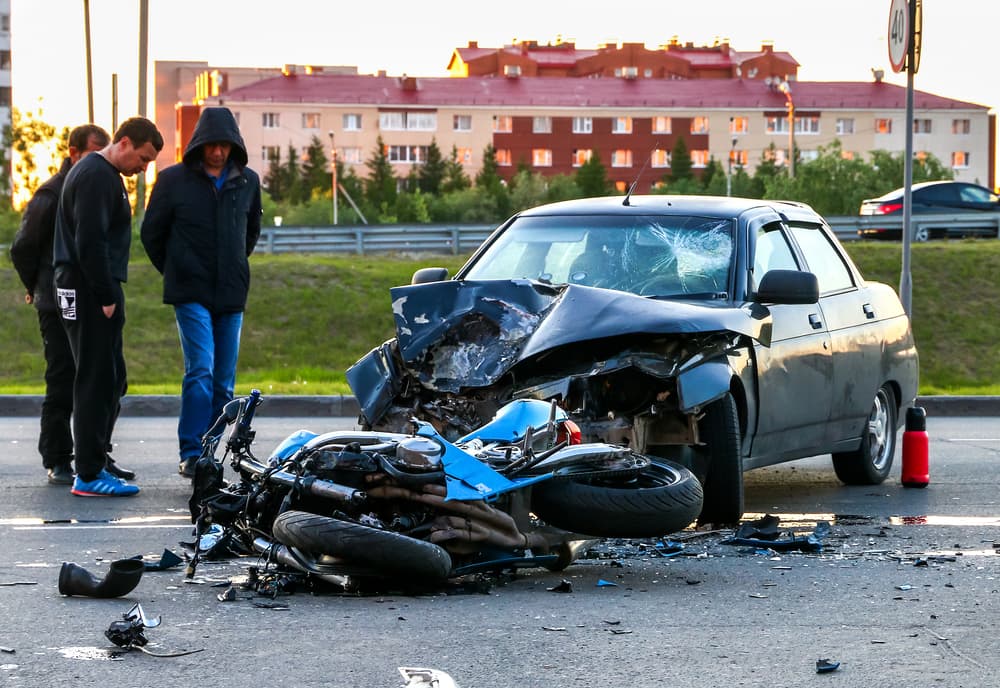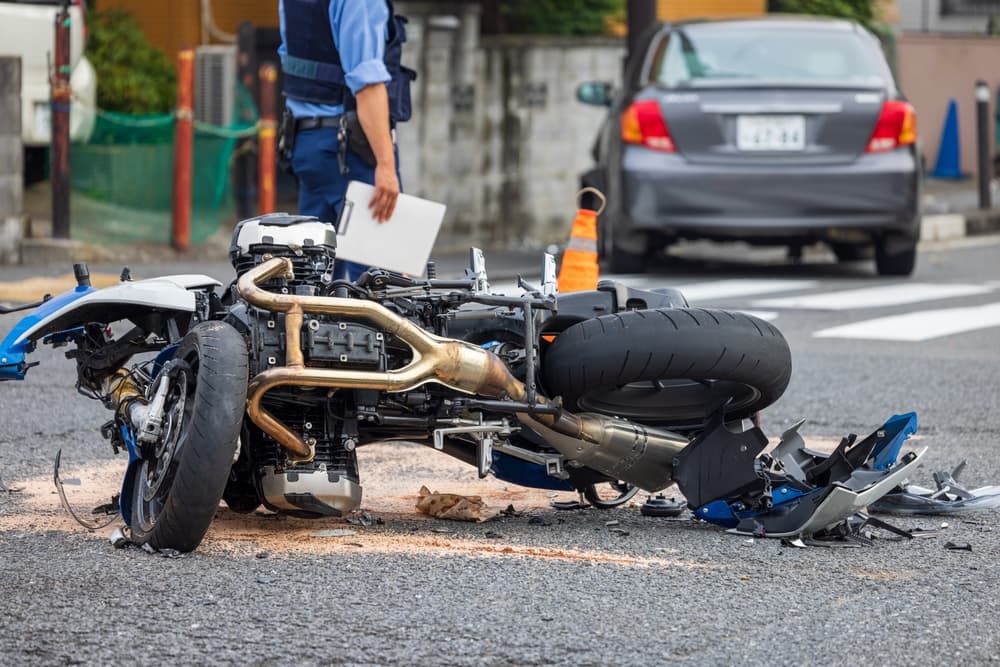Whether cruising down a coastal highway or weaving through downtown traffic, motorcycling offers a sense of freedom and excitement that draws enthusiasts from all walks of life.
This thrill, however, comes with risks. Motorcyclists often face significant injuries when accidents occur due to the lack of protective barriers between them and the road or other vehicles. Such injuries can result in substantial medical expenses, loss of income, property damage, and additional financial burdens.
If you suffered injuries in a motorcycle accident, you may wonder how much compensation you can expect. The details of your case, including the extent of your injuries and the determination of fault, will influence any potential settlement.
A motorcycle accident lawyer can study all the factors that contributed to your accident and the injuries you sustained, allowing you to better understand the compensation you should expect.
Understanding Motorcycle Accidents

Motorcycle accidents usually fall into a distinct category from other traffic accidents, with the former often resulting in more serious injuries for the rider. The specifics of a motorcycle accident can significantly influence the ensuing legal proceedings, which means that if you suffered injuries in a motorcycle accident, you need an experienced personal injury lawyer to navigate your claim.
Common Motorcycle Accidents and How They Occur
Motorcycle accidents can occur for several reasons and may include many scenarios:
- Head-on collisions: A head-on collision occurs when a vehicle strikes the motorcycle from the front. These collisions can quickly prove fatal due to the extent of the damage from the combined force of both vehicles.
- Distraction: Not paying attention is a serious problem for any driver, but it can be even more devastating when sharing the road with a motorcycle. Inattentive drivers, including those using their phones while driving, may not notice the presence of a motorcycle around them.
- Alcohol: Driving under the influence can make a driver's behavior highly unpredictable and slow their reflexes, raising the risk of a collision.
- Speeding: At high speed, drivers may have less room to react to potential hazards, including responding to the presence of a motorcycle on the road.
- Tailgating: Driving too close behind a motorcycle can make it hard for drivers to react in time if it slows or stops suddenly. Motorcycles are also much more maneuverable than the average passenger vehicle, which means the drivers of passenger vehicles may not have enough time to stop in an emergency.
- Lane-splitting: The risk of an accident increases when motorcyclists lane split, or travel between two slower or stationary lanes of traffic. This situation often occurs because other drivers don't allow motorcyclists a full traffic lane to themselves.
Each scenario may lead to serious injuries or even fatalities for motorcyclists. In addition to motorcycles colliding with cars, these accidents can be motorcycle only, where the motorcycle collides with a stationary object or the roadway.
Common Motorcycle Accident Injuries
Given their increased vulnerability on the road, motorcyclists frequently bear the brunt of an impact. Common injuries include minor scrapes and bruises and serious conditions, such as fractures, spinal injuries, and traumatic brain injury.
Road rash remains a major problem for many motorcycle riders after an accident. The gravity and types of injuries can significantly influence your due compensation in the aftermath of a motorcycle accident.
Deciphering the specifics of the accident, such as where it happened, how it happened, who it involved, and the resulting injuries, requires meticulous attention to detail. A lawyer would pore over police reports, witness testimonies, and medical records, among other things.
Key Factors Influencing Compensation
After a motorcycle accident, the first question you might ask is, "How much compensation do I deserve?"
Every case has its own unique set of considerations, and many factors influence the amount of compensation.
A lawyer has the training to determine the losses you sustained, evaluate the accident, and provide you with more information.
1. The Liable Party
Determining who bears fault is one of the first steps in a motorcycle accident case. This process studies the actions of all parties involved in the incident.
An experienced lawyer will investigate the accident and collect appropriate evidence to demonstrate what occurred at the time of the incident. They will use this evidence to attempt to prove the other party's negligence and explain how it directly led to the accident and your injuries.
Deciding which party has liability is vital in determining the compensation you can recover since the liable party's insurance company will usually take on responsibility for paying damages.
To maximize your compensation, your lawyer will demonstrate that the other driver's negligence led to your accident and, as a result, you deserve compensation from the insurance company.
2. Your Injuries
The extent of your injuries is another significant factor. More serious injuries generally necessitate higher compensation due to increased medical costs and long-term effects on your quality of life. A lawyer can fully account for these costs—those you've already incurred and those you're likely to face.
Discuss your post-accident prognosis—and how it may influence the future medical bills you can expect—with your care provider. Talk to your lawyer about all the medical bills you've incurred as a direct result of your accident, including the cost of therapy, durable medical equipment, and any modifications you may need to make to your home.
3. Lost Earnings
Your lawyer can consider your lost income if your injury has kept you out of work. They can also discuss the impact of your injuries on your future earnings, including whether you will lose your capacity to work in your preferred field or lose your faculty to work at all. Income losses can create a substantial financial challenge after your motorcycle accident, making it difficult to move forward with your life.
4. Pain and Suffering
Your lawyer may not just explore your direct financial losses when considering the compensation you may deserve after your motorcycle accident. They can also take a careful look at the suffering you dealt with: both the physical pain pertaining to the accident and any ongoing challenges, including emotional losses, loss of independence, resulting medical conditions (such as post-traumatic stress disorder or anxiety), and changes to your relationships after your accident.
You don't have to face this alone. A skilled lawyer can stand with you every step of the way, advocating for your rights and ensuring they consider all relevant factors.
The Role of Insurance in Accident Compensation
After a motorcycle accident, insurance companies play a significant role in determining what compensation you might receive. Dealing with insurance companies can prove challenging, especially during your recovery. A skilled lawyer can make the process considerably smoother.
Insurance companies primarily aim to pay as little as possible on claims.
To reduce the compensation they have to pay out, which can leave you without the funds you deserve:
- The insurance company may attempt to downplay the extent of your injuries: claiming they don't debilitate you as you say, or the injuries are not a result of the motorcycle accident. In all these cases, the insurance company could reduce its compensation obligation.
- The insurance company may try to deny the extent of the medical care you need to recover from your motorcycle accident. It may, for example, try to prove you didn't need extensive physical therapy or require a long stay in a rehabilitation facility, even though these things were vital for your recovery.
- The insurance company may try to prove that you somehow caused or contributed to the accident. It can reduce its financial burden if it demonstrates that you caused the accident.
- You may receive an early settlement offer that ignores the full extent of the damages you sustained in the accident. That low settlement offer may not include the full compensation you deserve.
Your lawyer will recognize these tactics and any others the insurance company may try to throw at you. Your lawyer will advocate for you, ensuring the insurance company receives all the relevant information to assess your claim correctly.
Navigating the complexities of insurance claims often requires extensive legal knowledge. An experienced lawyer knows how to handle negotiations with insurance companies, ensuring you receive a fair settlement. They will review the details of the insurance policies involved, including your own and that of the other driver, to determine all potential sources of compensation.
The insurance company's offer won't, in most cases, adequately cover your losses. If negotiations don't result in a fair settlement, your lawyer might advise filing a lawsuit against the at-fault party.
While dealing with insurance companies in a legal context can seem overwhelming, a dedicated lawyer will use their knowledge to steer the negotiations, aiming to secure the best possible outcome that aligns with your case and specific circumstances.
Legal Process After a Motorcycle Accident
Once the dust settles following a motorcycle accident, you may embark on a journey you never planned—the legal process. This process often includes various stages, such as collecting evidence, negotiating with insurance companies, and, potentially, litigation. Hiring a lawyer to guide you through this process can make a significant difference in your experience and the outcomes you receive.
Immediately after the accident, your lawyer will gather evidence to support your case. This evidence could include the police report, photographs from the accident scene, witness statements, and medical records detailing your injuries. Your lawyer will analyze this evidence to build a persuasive case demonstrating the other party's liability.
Negotiations with the insurance company typically follow the evidence collection phase. Your lawyer will present your case to the insurance company, highlighting the other party's negligence and the degree of harm you've sustained. This advocacy can significantly influence the insurance company's assessment of your claim and their willingness to negotiate a fair settlement.
When negotiation with the insurance company doesn't present satisfactory results, your lawyer might recommend moving to litigation. A lawsuit involves complex processes, including serving the complaint, the discovery phase, and a trial (if necessary). During a trial, your lawyer will advocate for you, presenting your case to a judge or jury to secure the best possible outcome.
Contact a Motorcycle Accident Lawyer Today to Discuss Your Claim

Understanding the intricacies of a motorcycle accident case is far from simple. Each case presents unique details, including the accident's circumstances, the extent of the injuries, and negotiation with insurance companies.
While no lawyer can guarantee a specific outcome or timeline, they can provide you with guidance, advocacy, and support. They endeavor to protect your rights and get compensation for you. If you suffered injuries in a motorcycle accident, contact a personal injury lawyer as soon as possible to discuss the compensation you deserve.








